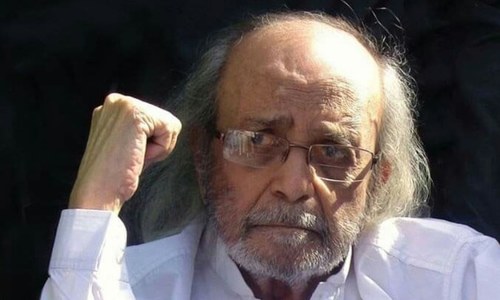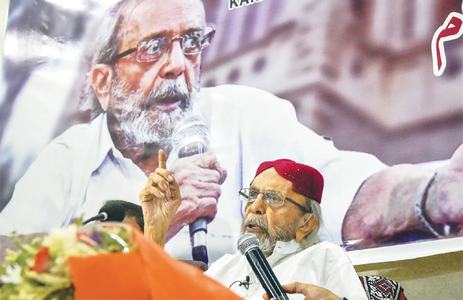SALEEM Asmi’s death last week was always going to be untimely and too soon for journalists and cultural dilettantes allowed into his charmed circle. They comprised many who got addicted to his sagacious presence that toggled between poetry and art, between classical music and love of journalism as a tool of democracy. Rarely would he open up on his Marxist struggles and the hopes he harboured for Pakistan till he passed away on Saturday morning in his sleep.
Asmi succeeded the respected Ahmad Ali Khan as Dawn’s editor two decades ago but left all too quickly to run a private cultural club from his drawing room in Karachi that rivalled Satyajit Ray’s Jalshaghar. Before leaving Dawn, he gave it all he had learnt in over 60 years in the profession, recasting the paper as a literary morning treat most notably so at weekends. He also tapped me to write for the paper from New Delhi to assist the late scribe Uma Shankar Phadnis who was Dawn’s India stringer for decades.
Some believe Asmi Sahib marked a big departure from the days of Ahmad Ali Khan who held sway over the newspaper’s editorial policy for a quarter of a century. It’s likelier that the two represented very different eras in Pakistan’s turbulent history. Keeping the paper alive and without compromises during the Zia dictatorship required a different set of skills and making the paper more presentable was another.
Khan Sahib and Asmi Sahib both belonged to the left’s struggle against autocratic impositions on the media. And like Asmi, Khan Sahib masked a lovely sense of humour to cope with the challenge. Sample the story Khan Sahib shared with me — of which my uncle S.M. Mehdi was a key part. They were both members of the Communist Party in Bhopal, which meant that their struggle was different from Gandhiji’s. They were, like Sheikh Abdullah and others, fighting feudal princelings, while Congress fought British rule. The commune Khan and Mehdi ran in Bhopal was called Anjuman-i-Kohla, literally a club of lazybones. The club rule decreed that the comrades — Jan Nisar Akhtar, Kaifi Azmi, Sardar Jafri, the works — who were found relaxing horizontally gained a higher listing than those sitting. The sitters were to do the odd jobs, buying cigarettes and making tea till a new entrant into the room relieved them. Khan Sahib’s newsroom, of course, was anything but.
Where nationalist zeal was concerned, Asmi Sahib was bereft of any. This was not always possible for others.
I first met Asmi Sahib in Dubai in November 1979. He was going to be The Khaleej Times news editor, and I was headed to join the reporter’s desk at Gulf News.
It may seem strange, but Ziaul Haq’s military coup was a boon for many of us journalists from India who looked stranded on the listless sands of Dubai regardless of the creature comforts on offer. In the newsrooms of The Khaleej Times and Gulf News, and later in our homes, we got to meet Saleem Asmi and other legends of Pakistani journalism, all fugitives from Zia’s tyranny. These representatives of the halcyon days of good writing and purposeful content included those who had apprenticed with Faiz Ahmed Faiz and Mazhar Ali Khan, giants of Pakistani journalism.
Saleem Asmi, Aziz Siddiqui, M.J. Zahedi led the troopers in Dubai, who included Aslam Sheikh, Tahir Mirza, Maruf Khwaja and Mahir Ali from among the best. Asmi harnessed the energy of his newsroom into a cultural collage of South Asia. Aziz Siddiqui did likewise with Gulf News. News desks and reporters’ rooms were energised into a rendezvous where Indian, Pakistani, Bangladeshi and Sri Lankan journalists mingled on condition that they first shun traces of any nationalist baggage.
Both, Aziz and Asmi, had been in and out of prison in defence of the freedom of speech in Pakistan, assaulted first by Ayub Khan and later by civilian rulers in accord with their own needs. The problem here was that Asmi held free speech to be the leitmotif of all journalism, and Aziz Siddiqui completely agreed with his comrade’s views. Both were cosmopolitan and became popular with Dubai’s expatriates, but were celebrated a tad more by the subcontinental communities for their fair and professional handling of political and cultural creases. It was not always an easy path. There were routine demarches from Pakistani and Indian embassies, for example, over alleged distortion of Kashmir’s maps, but handling the pressure was part of the day’s work for both. This training should be made mandatory for all aspiring cross-border journalists.
Where nationalist zeal was concerned, Asmi Sahib was bereft of any. This was not always possible for others. He smiled at those who struggled with the baggage. On one occasion we found Asmi chortling. His friend Tahir Mirza was in trouble with Madam Noorjehan who had been singing in the evenings at the Expo Centre in Sharjah. The problem was tricky and Zahedi Sahib, the editor, didn’t quite know how to help. Mirza, it turned out, had penned the previous day’s leader in which he praised a concert by India’s Lata Mangeshkar at a five-star gala in Dubai. He thought Noorjehan’s singing every night at a noisy venue packed with taxi drivers was a letdown for Pakistan. Noorjehan found Mirza on the phone, and with her Punjabi invectives threatened to have him kidnapped in Lahore! A contrite clarification was ordered in the following edition of the paper.
I last met Asmi Sahib at a function in Karachi where his friend I.A. Rehman was speaking. After the speech, Rehman Sahib took a seat behind Asmi, and whispered that he was leaving. “Where are you off to?” Asmi asked the loaded question, not entirely unaware of the answer. “I’m going to your house,” Rehman Sahib replied. “In that case I should consider joining you,” replied Asmi. It was evening and friends were waiting in Asmi’s living room, his jalshaghar of a lost revolution.
The writer is Dawn’s correspondent in Delhi.
Published in Dawn, November 3rd, 2020
















































